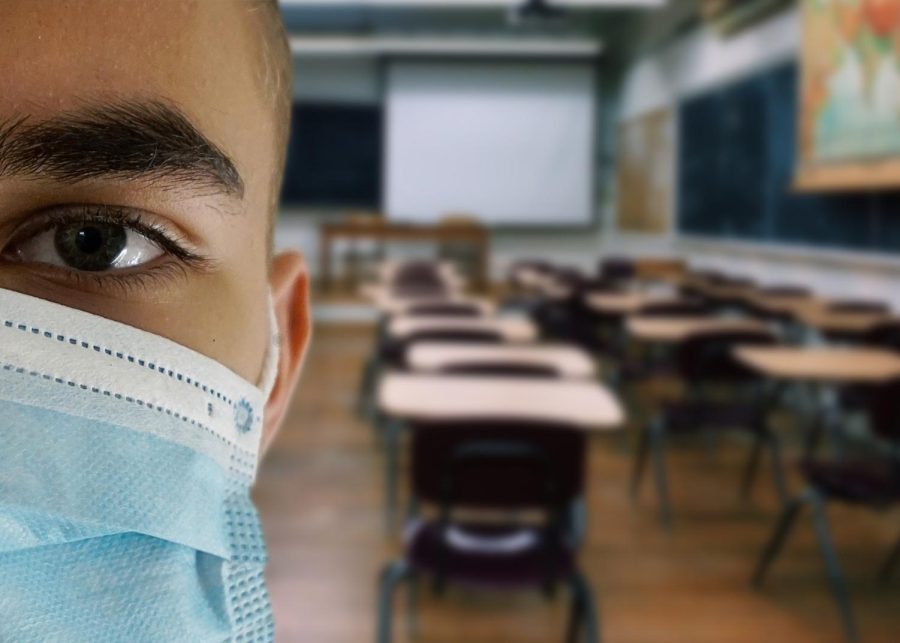The After Effect of Covid-19 on Student Behavior
What is this underlying issue and how are we trying to solve it?
December 6, 2021
Covid-19, a disease that can trigger a respiratory tract infection, made students of all ages go into online school for the year in order to prevent its viral spread. But now, in 2021, school is back in person, and one issue is apparent, a change in student behavior. But how did Covid-19 affect student behavior? What are the behaviors, and how are we trying to combat these issues?
Student behavior has overwhelmingly changed due to the negativity brought about by Covid-19.
“Student behavior referrals are up, as middle schoolers hurt each others’ feelings with comments they’d usually only be bold enough to say online,” states Kalyn Belsha, a Chicago social worker. “Social workers have seen more verbal and physical fights.”
Belsha noticed a small uprise in disruptive behaviors. Visibly bathrooms were being trashed, students fought each other on social media, and students were running out of classrooms without permission. While other students resorted to being quiet, refusing to talk, listen, or pay attention.
In an interview with San Pasqual High School student, Ethan Burgos the same post-Covid negative behavioral noticings were expressed. “The mandate to stay at home for a year, and the physical distancing between people, has led to isolation between people and mental loneliness,” states Burgos.
This “mental loneliness” was a part of a big trend of anxiety and depression being put on students. “Engaging in behavior that makes someone feel bad can activate unpleasant feelings, which then creates a vicious cycle,” states Zawn Villines of Medical News Today. “The worse a person feels, the less likely they are to engage in behaviors that benefit them.”
This is why students are acting the way they are right now. The unpleasant memories and emotions from Covid-19 are causing students to engage in inappropriate behaviors, brought on by this “vicious cycle.”
To combat this issue the state issued new guidelines relating to student discipline. Tony Thurmond, the State Superintendent and Public Instruction behind these guidelines provided a list of new alternatives to handle these behaviors. Instead of suspending students, which is now being “minimized,” as Thurmond puts it, suspensions are being replaced with “support.” This “support” is intended to help difficult students with any sort of problem they might have, as an alternative to suspension.
When asked how he would solve the problem, Burgos replied “there should be a punishment, but it shouldn’t be severe… you should be reprimanded if you are misbehaving, but punishments should be severe only if the student is misbehaving severely.”
San Pasqual High School adopted a new tool to deal with these behaviors called restorative practices. SPHS is hoping to “create a positive, supportive school environment for all of our students and staff,” states San Pasqual High School Principal Cory Gregory.
The school focuses on building relationships and community between students using a restorative circle approach. This circle can be broken down into 4 stages, each one planning to ensure student happiness and accountability for one’s actions.
“The premise of restorative practices is that people are happier, more cooperative and productive, and more likely to make positive changes,” states the International Institute for Restorative Practices.
But, how do we judge what a severe post-Covid behavioral response might be? Where is the line drawn? And who makes this judgment call? Online schooling, as a result of Covid-19, brought with it anxiety, depression, stress, and more to students. These stresses made students act irrationally to try to suppress the unpleasant memories of Covid-19, making staff, teachers, and other students uncomfortable and distracted. So far to combat this issue, we have adopted a new system of restorative practices, while our state is trying to make support a better option than suspension. With only a couple of weeks of school so far, only time will tell whether this underlying issue will be resolved with other alternative methods or patience.



